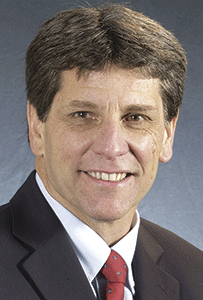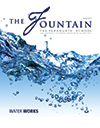Taking the Helm
Steering graduate education into a new era

Steve Matson, professor and chair of the department of Biology, will become the new dean of the Graduate School on July 1, 2008.
For many current and former biology students at the University of North Carolina at Chapel Hill, Steven W. Matson, Professor and Chair of the Department of Biology, has been a familiar face at Fordham Hall. Matson is a respected scientist, a dedicated teacher, and a visionary leader. He has worked diligently to shape young minds and build the biology department into a nationally recognized leader. He is also a prime catalyst behind the new Genome Sciences Building now under construction and he has been a dynamic leader in the biological sciences on campus.
On July 1, 2008, Matson will leave his role as Biology Department Chair to take on a new challenge: Dean of the Graduate School. Though he will not be leaving his lab entirely, he will have a new residence in Bynum Hall. He is excited and ready for the new challenge. He brings to the position more than 24 years of service to the University and an impressive resume that reflects a dedication to graduate education at Carolina.
Matson will be taking over a program that flourished under Linda Dykstra’s leadership. He admires Dykstra’s visionary spirit and her many accomplishments.
“Linda Dykstra has set the bar high and she will be a very tough act to follow,” Matson says. “I hope to build on the already outstanding program she has put in place.”
Matson is an ideal candidate to lead the Graduate School into a new era. He has a wealth of experience in higher education and as the Chair of the Biology Department he has been an advocate for graduate students. In his role as chair, Matson worked with the Graduate School to develop the innovative parental leave program. He also worked to implement a departmental system to ensure all graduate teaching assistants receive a competitive stipend.
As a researcher, Matson has focused on the repair of DNA as it relates to cancer and genomic stability, and on the mechanisms by which genetic information is exchanged among bacterial cells leading to antibiotic resistance. He has received grants from the National Institutes of Health and was the recipient of the prestigious American Cancer Society Faculty Development Research Award, a national award designed to advance the research of promising young scientists.
Matson has also excelled as a leader in the classroom. In 2004, he received the Tanner Award for Excellence in Undergraduate Teaching. He developed an innovative honors course in Genetics and Molecular Biology that incorporates creative writing. He also has been committed to leading a yearly seminar for first-year doctoral students.
In the classroom and in the laboratory, Matson has seen first hand the contributions of graduate students to the University’s mission.
“A key role of the graduate dean is to never let the University loose sight of how critically important graduate students are to our success.” Matson says. “The members of the Board of Trustees absolutely want this place to be a premier research university. That cannot happen unless we pay attention to what our graduate students need to succeed. My vision for the Graduate School is simple: We must continue to strive to be the best graduate training institution in the nation.”
To achieve that goal, Matson says the University must be forward-thinking and willing to take the risks necessary to meet the demands of a rapidly changing world.
“One of the key things we need to think about is growth.” Matson says. “That is the single most important challenge we will face in the coming years. We also need to spend time thinking about what I call ‘the changing face of graduate education.’ The jobs available to our graduates will be different from those in the past. We need to attend to those differences in the training of our students.”
Matson says that there must be support for students so they can work productively on their dissertations as well as support for faculty who serve as their mentors. “We must find ways to promote interdisciplinary collaboration that will allow our faculty and students to address difficult questions that lie at the margins of traditional disciplines,” he says. “Most of all, the graduate dean must continue to make the case for support of graduate students within the University and the State. The Graduate School can and should lead in all these areas.” • J. Todd Brantley


